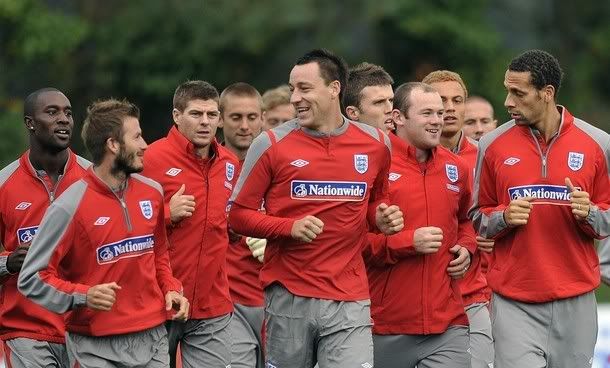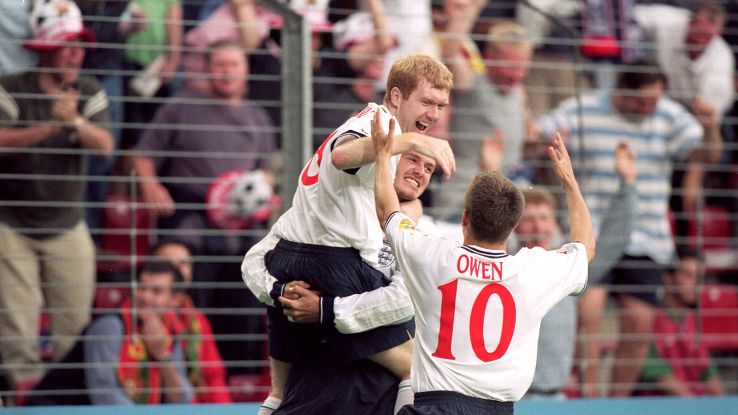
Earlier this year, Frank Lampard decided to join Steven Gerrard in international retirement after lengthy England careers that were in the end highly unfruitful and with that the curtains finally fell on the last of England’s golden generation. Both were the spearheads of the 3 lions so-called golden generation that burst onto the scene at the start of the millennium and both were also part of the expectation riddled sides that never lived up to their potential as a unit. Very rarely do golden generations come about for sides as inconsistent as England but by the 2004 European championships in Portugal, it seemed as is if England’s golden generation was indeed something which was happening. Ashley Cole was tearing up trees at Arsenal, John Terry had been appointed new Chelsea captain, Frank Lampard was beginning to show he was a top talent, Steven Gerrard was Liverpool’s captain and talisman Wayne Rooney was the new wonder kid on the block. If you add those names to the likes of David Beckham, Owen Hargreaves, Rio Ferdinand, Michael Owen and Paul Scholes – you had an exceptional looking team!
However when you have such a collection of top class talents, you need somebody to whip them into shape and make them gel as a team whilst also getting the best out of them individually. Unfortunately England faced a problem in this department in the shape of a negative Swede by the name of Sven Goran Eriksson. He had managed mainly in the Serie A before taking the job in 2001, winning the league title with Lazio and his Italian past should have been an indication as to what sort of defensive manager the FA were getting. Eriksson set his sides up to not be beaten and had a solid defence to build on it, but England had the talent up top to attack their way to success and soon his lack of philosophy as well as inability to get the best out of the sides biggest names ensured that this golden generation went to waste under his leadership.
In Eriksson’s first major tournament in 2002 at the World Cup, things started well for him as England topped their group even beating old enemy Argentina along the way. They then defeated a fairly strong Danish side in the last 16 by a scoreline of 4-0 as they became the tournament’s most miserly defence. Although he was to be somewhat found out against a side of Brazilian superstars in the last 8 as following an Owen goal giving England the lead, their opponents albeit slightly fortuitously went 2-1 up. There was very little response as the Brazilians looked comfortable in closing out the game as the 3 lions showed a worrying lack of creativity.
By Euro 2004 though, England had become stronger and in their opening game were robbed by the French who produced 2 injury time Zinedine Zidane goals to win the game 2-1 after Rooney had given England the lead. However they responded to comfortably win their last 2 games in high scoring affairs against both the Swiss and the Croatians, playing some lovely football in the process. Wayne Rooney had been setting the tournament alight at the tender of age of 18 and gave his side the lead in their quarter-final clash with hosts Portugal but shortly after he broke his metatarsal in a freak incident in which his boot came off and suddenly England became vulnerable in a game they had been dominating. They eventually ran out highly unfortunate losers after being defeated in the dreaded penalty shoot-out following a thrilling 2-2 draw.

Another crucial reason for England’s underachieving was the deployment of Paul Scholes. The midfielder was the 3 lion’s one superb technical maestro that could pull all the strings on the international stage and could have easily slotted into to any of the world’s best midfields. However, for his country he was used on the wing, with Lampard and Gerrard placed in the middle who both never repeated their club form in the white shirt and certainly never worked as a duo. If England could have built a team around the Manchester United man, they may have won something, although as it was the midfielder called ‘the player of his generation’ by Andres Iniesta was used out of position. Eventually disillusioned, Scholes announced an early international retirement after Euro 2004. Such a waste of a top talent, who unfortunately was a victim of the England mentality of effort before skill.
Furthermore the system was a problem as England deployed a rather simple 4-4-2 formation in the majority of their games. This tactic just does not work in international football anymore as the midfielders will get overrun if it is employed. A pre-historic tactic to back a team and manager trying to do things as if they were in the dark ages. On the topic of tactics, by not having Scholes in the centre, Gerrard and Lampard had the task of controlling the game. Something they were never up to as they simply weren’t technically gifted, skillful or intelligent enough in a football sense to run the show on the international stage.
The superstar status of many players also contributed, with many of the them seen driving around in flashy cars and out partying far too often when they should have all been out trying to gel as a team on the training pitch and not at the posh clubs. David Beckham, the captain, was at the head of this as he pursued the life of a famous superstar and many tried to follow suit. The players WAGS were also a problem, particularly in the 2006 World Cup as the likes of Cheryl Cole and Victoria Beckham amongst other provided too much of a distraction from the intense pressure of the tournament.
Expectation is another word used for the non-success of the team. In England plenty of sports are played but nothing means nearly as much as football in a sport crazy country, who have only ever produced one set of winners in the beautiful game in 1966, who were around before many fans were even born. After years of heartache and pain the England fans have built up winning any major tournament as a holy grail, nothing would mean more to most Englishmen than to win a second World Cup and this intense pressure may have restrained the team somewhat. The press, fans and huge hype followed this particular side everywhere as the country started to see that they had a team capable of actually doing something, was too much in all honesty and a major disadvantage. This immense pressure may have seen many crawl into their shells or become crippled with fear when on international duty. At the time the whole experience of playing for their country was a horrible one for the England players.
The 2006 World Cup was when expectation was highest and the last real chance for the golden generation to win whilst still at the top. England were unimpressive but scraped their way through the group-stages, topping a group containing Sweden, Trinidad and Paraguay. In the last 16 they were also not convincing but beat Ecuador 1-0 with many beginning to say that they might do the reverse of what is deemed normal and peak in the latter stages of a major tournament. However, that wasn’t to be as things were clearly going badly wrong around the team’s set-up. They met Portugal once again in the quarter-finals and played out a drab 0-0 before losing inevitably on penalties. Eriksson left his role straight after and Beckham resigned as captain. A rare opportunity to dominate world football was gone for England and what could have been a superb team eventually amounted to nothing. They admittedly suffered harsh luck through Gerrard’s back pass v France, Rooney breaking his metatarsal v Portugal, Sol Campbell’s disallowed goal v Portugal also, Rooney getting injured just before the 2006 World Cup and the inability to win in the dreaded penalty shoot-out.
I am also a believer that England may have done something if a major tournament had been played in 2005 as at Euro 2004 they were too inexperienced but by World Cup 2006 they had passed their peak. Although you can’t make excuses, they just weren’t good enough and a lot of bad decisions were made as they repeatedly shot themselves in the foot. So this golden generation that could have won 1 or 2 major tournaments ended up not even making it past the quarter-finals of one. A sad point to reflect on as an England fan as it was an opportunity thrown away!
Members of the Golden Generation:
Goalkeepers: Paul Robinson, David James
Defenders: Gary Nevile, Rio Ferdinand, John Terry, Ashley Cole, Jonathon Woodgate, Jamie Carragher, Ledley King and Sol Campbell
Midfielders: Owen Hargreaves, David Beckham, Frank Lampard, Paul Scholes, Joe Cole, Steven Gerrard and Michael Carrick
Forwards: Michael Owen, Wayne Rooney, Jermain Defoe and Peter Crouch
